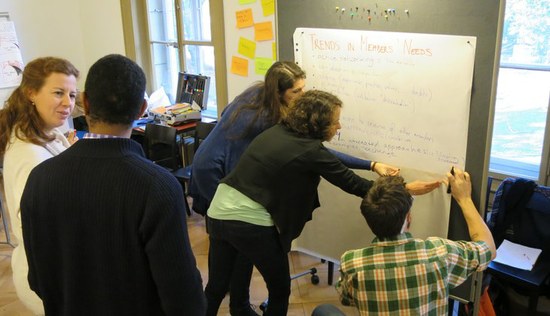 Contribution to the Annual Report 2016 of the MMI Network
Contribution to the Annual Report 2016 of the MMI Network
In 2016 the Network Medicus Mundi Switzerland (MMS) has worked on its new strategy – with some remarkable results. To be honest: I was very much convinced of the quality of our former strategy which was limited to end of 2016. At the beginning of our process to renew our network strategy 2017-2019, I therefore expected that we will end up with an only slightly updated strategy. Obviously I underestimated the dynamic of the process to discuss the strategy with our 50 Swiss member organisations, all of them working in the field of international health cooperation and global health. And I underestimated that the challenges these organisations are currently facing would influence the process so strongly.
In an early stage the Board of Medicus Mundi Switzerland decided to design the new Network strategy in close cooperation with the Network members. Based on that we initiated the strategy process in January 2016 with a workshop for member organisations to outline the challenges to which the strategy was expected to respond. The next day our Board met to outline the key components of the new strategy based on the outcomes of the workshop. With these elements the MMS secretariat and Board drafted a first version of the new strategy which was, in spring 2016, sent to the Network members for an online consultation. This resulted in a renewed draft which was discussed, finalized and approved by an extraordinary General Assembly in September.
The close collaboration with our member organisations in developing the new strategy helped to design a document that reflects their current challenges and their expectations towards the Network.
During the workshop the Network members referred to the changing environment in Switzerland that is shaped by a strong isolationist political trend that tends to put economic defined self-interests into the heart of Switzerland’s foreign policy. The value of a solidary, cosmopolitan nation is getting more and more lost. Of course this is not only a Swiss, but unfortunately a global trend. However it strongly affects the work of all the organisations – NGOs and academic institutions – working in the field of international health cooperation.
Besides this political trend the Network members referred to another major change in the environment of health cooperation: On the global level the Millennium Development Goald (MDGs) have been replaced by the much more holistic framework of the UN Agenda 2030 (Sustainable Development Goals, SDGs) – a move that has brought a paradigmatic shift towards a global development plan that breaks up with the classical donor-driven aid model in favour of a partnership model, where governments of all countries share the same responsibility for sustainable development.
How does the new MMS Strategy 2017-2019 react on this changing environment? The member organisations concluded that there is a need to much better reflect their own work critically: We want to define our own the way into a world beyond aid – we don’t want to legitimize our work towards right-wing, isolationist and populist movements but towards our partners worldwide. We want to share and debate our approaches to make this world healthier in all senses, and we want to reflect self-critically our experiences.
Out of these reflections MMS decided to promote the development and implementation of best practices among its member organizations by creating a platform for critical reflection of the work of these organizations and the knowledge base for international health cooperation.
Based on this goal MMS will conduct learning processes on issues defined by its member organisations. Some of them gathered on a platform on implementation research for a still better understanding of their own work and for an NGO driven research that transforms health conditions and societies by a people owned research.
With the implementation of the strategy, we expect to become an indispensable community of practice committed to and useful for the work of Swiss institutions and organizations involved in international health cooperation. Based on this we also want to improve our skills for strengthening our political influence here in Switzerland. This is important for us as we still urge for a solidary Switzerland that recognises its responsibility for this planet.
Exactly this is reflected in our much more political vision: the Network Medicus Mundi Switzerland aims for health for all around the world and for a Switzerland that is committed to the right to health. This means conditions for all people across the world in which children can be born and grow up in a healthy manner and in which adults can participate in society, pursue work that is not detrimental to their health and can age with dignity.
We have the vision of a world in which all people, without exception, have equal access to comprehensive, affordable and quality health services. And we have the vision of Switzerland which takes a united, pioneering role in the fight for the right to health for all around the globe.
- Author and photo: Martin Leschhorn
- More information: www.medicusmundi.ch
- Contribution by Medicus Mundi Switzerland to the Annual Report 2016 of the MMI Network
- Download: PDF
